Attracting, training, and retaining a skilled and diverse workforce are hallmarks of the federal Judiciary. Critical support systems and innovative human resource practices are vital to the efficient operation and management of the Judiciary.
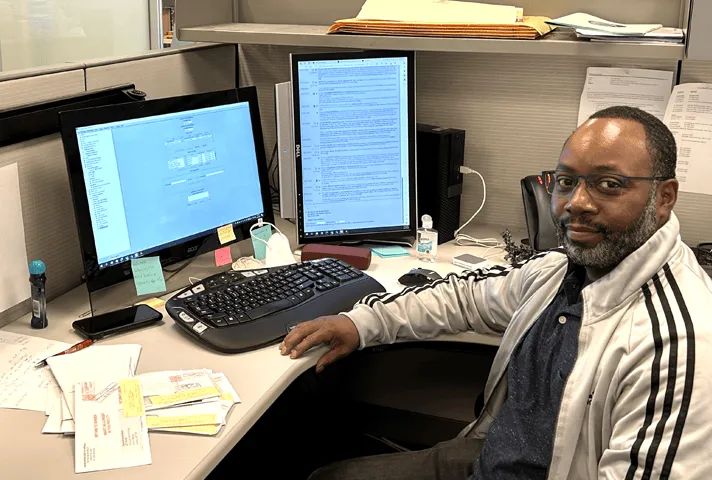
Clifford Jackson, a case administrator in the Eighth Circuit Court of Appeals, is supported by modern IT networks and equipment.
Recruiting a Talented Workforce
The Judiciary is committed to recruiting a talented and diverse workforce that addresses the current and future needs of the courts. There were several initiatives underway in 2023 in support of attracting and recruiting a diverse pool of talented applicants for internships, clerkships, and permanent positions in the courts.
Judiciary Workforce Planning and Recruitment
The Administrative Office of the U.S. Courts (AO) initiated the Judiciary Workforce Planning and Recruitment Modernization Project to evaluate its current processes and to implement strategic workforce planning and talent acquisition strategies that best support the courts’ decentralized operational structure. Strategies include enterprise-wide planning resources, improved outreach, unified branding, and shared recruitment tools and best practices.
Expanded Recruitment Outreach
The AO expanded its outreach in recruiting and educating candidates on the federal Judiciary’s mission and career opportunities. In 2023, the AO participated in the Equal Justice Works Career Fair, the largest public interest legal career fair in the country. AO staff hosted virtual discussions with groups of law students, recent graduates, law school staff, and public interest practitioners on the topics of opportunities in the Judiciary and ways to seek and apply for jobs. In addition, AO and federal defender staff participated in recruitment fairs at colleges, including historically black colleges and universities. A federal defender outreach event at Howard University School of Law was held in October 2023.
Improved Employee Onboarding
The AO implemented several new solutions to improve the employment suitability process for onboarding Judiciary staff in a more timely and efficient manner. In the fall, a new Fingerprint Transmission System (FTS) was made available for courts and federal defender offices. The web-based tool collects fingerprint and biographic data during background checks of employees, contractors, interns, externs, and volunteers. By securely transmitting and storing biometric data in a central server repository, FTS reduces the risk that personally identifiable information will be compromised.
A new hiring flexibility provided probation and pretrial services offices with the option to expedite the onboarding of law enforcement officers while they undergo their pre-employment medical exams.
Model Intern Program
The Model Intern Program in 2023 had nine interns in participating courts as part of the Judiciary’s efforts to connect talented undergraduate students with federal courts and prepare them for permanent Judiciary employment. The program features virtual brown bag lunches with judges and court staff, diversity and inclusion training, a 12-week interview and resumé skills workshop, and one-on-one career counseling with a professional career coach. Since the launch of the program in 2018, 39 students have been placed in yearlong internships. The program is aimed at nurturing interest in professional careers in the Judiciary and providing students of varying backgrounds the opportunity to work directly with federal judges and court executives.
Diversity, Equity, and Inclusion Working Group in Probation and Pretrial Services
The Diversity, Equity, and Inclusion (DEI) Working Group for Probation and Pretrial Services staff collected data from field offices to inform future education, recruitment, and retention initiatives. Collaboration efforts were also underway with the Federal Probation and Pretrial Academy to build a DEI curriculum for officer training programs. The working group was created in 2022 to strive for systemic fairness. In August 2023, working group members participated in a panel for the DEI Leadership Conference in Minneapolis.
Defender Services’ Diversity Fellowships
Recruitment began in October 2023 for the second cohort of fellows to participate in the federal defenders’ new Diversity Fellowship Program. They will begin their two-year terms in the fall of 2024.
The fellowship program began in 2022 with an inaugural group of 14 lawyers, who joined federal public defender organizations around the country as part of an effort to foster diversity in the ranks of federal defenders. The program creates a pathway for diverse attorneys to become qualified to join federal defender organizations and federal capital trial teams or to work as Criminal Justice Act (CJA) panel attorneys.
Twelve of the fellows are trained to work on non-capital cases, and two focus on representing people accused of crimes that can result in capital punishment. The lawyers receive training, mentoring, and opportunities to assist with client-centered representational work. The capital case fellows receive significant hands-on training through participation on several federal capital trial teams nationwide.
The program aims to improve the quality of CJA representation by providing intensive training for new and early-career attorneys from all backgrounds and to engender public trust in the fairness of the federal courts.
Expanding Employee Training and Development
The AO rolled out new management development classes on emotional intelligence, collaborative conflict resolution and manager mediation, and building rapport — all areas of focus in the agency’s employee engagement survey. The AO’s HR Academy also added writing classes on standard operating procedures, memos, and writing in plain language. The academy continued its collaboration with the Office of Fair Employment Practices to provide technical support for a new series of courses on Civility in the Workplace, Leading for Respect, Implicit Bias, Reasonable Accommodation, Filing a Complaint, and Harassment. The academy also offers courses related to orientation, paid parental leave, benefits and compensation, employee dispute resolution, fair employment practices, hiring, and training.
Other educational programs for employees include the Benefits for Life webinars, which address such topics as retirement planning and saving, the importance of having a will, mental health, and benefits elections. Judiciary Online University expanded its catalog with popular topics on diversity, communication, leadership, and IT certification.
Workforce Management Tools and Flexibilities
With the approval of the Judicial Conference, the AO approved modifications to the Judiciary’s telework policy. A robust and well-practiced telework program supports mission productivity and efficiency.
The Judiciary used other strategic workforce tools including Voluntary Early Retirement Authority (VERA), allowing the Judiciary to undergo restructuring, reshaping, downsizing, transfer of function, and reorganization. VERA temporarily lowers the age and service requirements in order to increase the number of employees who are eligible for retirement. The Judiciary also used Voluntary Separation Incentive Payment Authority, also known as buyout authority, for restructuring and providing an incentive for employees who have skills that are no longer needed in the workforce.
Director’s Leadership Program
Each year, candidates are chosen for the Director’s Leadership Program, a yearlong residency that offers well-qualified court and federal defender office employees the opportunity to work on national projects while learning about national issues and policies.
The Director’s Leadership Program residents for 2023-2024 are:
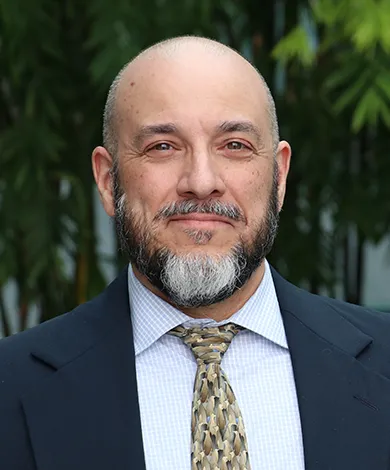
Angel H. Hernandez
Angel H. Hernandez, IT manager, District Court of Eastern Missouri
Hernandez is working with the AO’s Case Management Systems Office on its modernization plan, focusing on a strategy for allowing individual courts to customize national platforms to meet local needs.
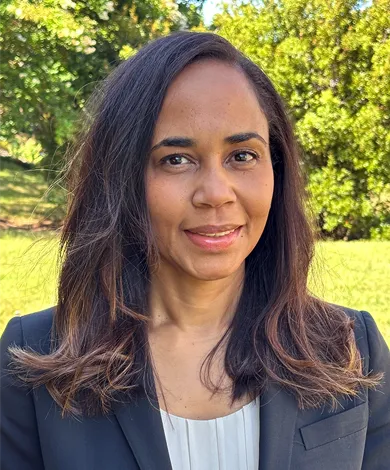
Jenniffe Inman
Jenniffe Inman, supervisory probation officer, District Court of Western North Carolina Probation Office
Inman is working with the AO’s Probation and Pretrial Services Office to incorporate national policies and procedures into training on Probation and Pretrial Case Tracking System 360.
2023 Director’s Awards
The AO Director presents the Director’s Awards to recognize outstanding performance in the federal courts over the course of the year. They are given for outstanding leadership, innovation and efficiency, and commitment to delivering the best possible service to the public. The recipients are nominated by colleagues based on career achievements and contributions to specific projects that have benefited their home courts and the federal Judiciary as a whole.
Director’s Award for Outstanding Leadership
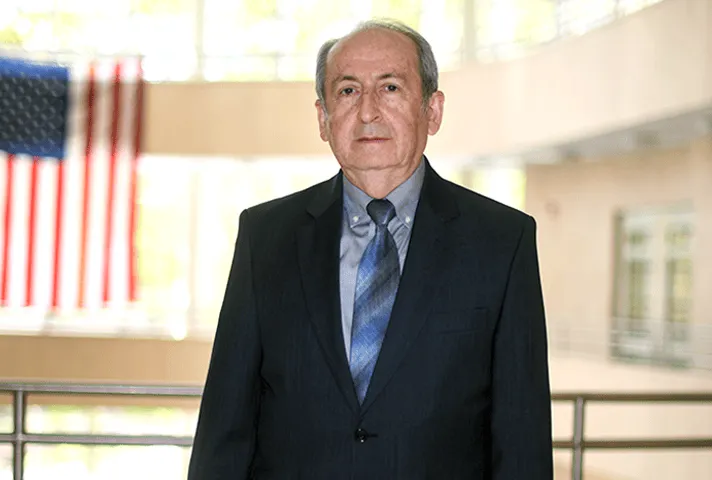
Aleksandr Usherenko, systems administrator for the Eastern District of New York, helped devise a process that automatically feeds case outcomes into the FBI’s National Instant Criminal Background Check System for firearms purchaser background checks.
Under Usherenko’s leadership, the court developed software to extract case disposition forms in all criminal cases from the Judiciary’s Case Management/Electronic Case Files system and associated data from the Probation and Pretrial Services Automated Case Tracking System to create a package containing case, counts, PDF documents, FBI numbers, Bureau of Prisons numbers, and other identifying information.
The Department of Justice matches the data received from the court and individual DOJ agencies with appropriate FBI systems to improve the ease and accuracy of criminal instant background checks.
Director’s Award for Excellence in Judiciary Services — Multiple Winners
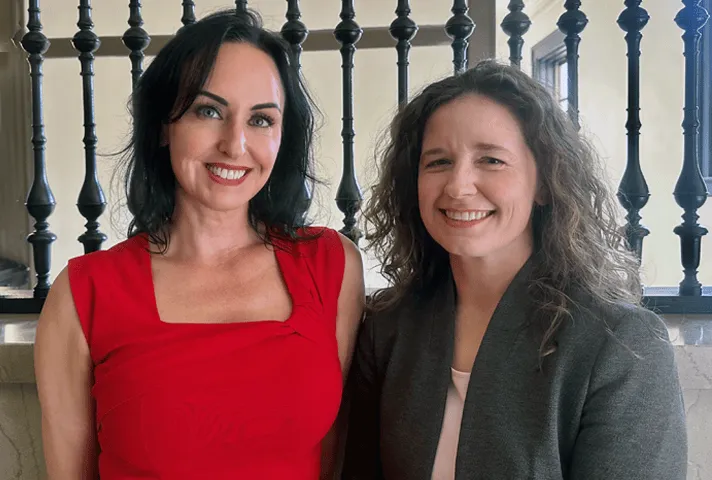
Kate Padbury, assistant circuit executive for court administration, and Adriana Dieringer, supervisory staff attorney, of the Fifth Circuit Court of Appeals, were recognized for greatly increasing the court’s efficiency in processing cases.
As leaders of the court’s new Quick Response Team, Padbury and Dieringer developed case-specific checklists that enabled the team to use a streamlined writing process for select case types. A lengthy, time-consuming briefing process was replaced with a technology-based, comprehensive checklist.
In late 2021, the court had 1,172 pending cases, which required an average of 12 months to process. By July 2022, the number of pending cases had fallen to 652, a decrease of 44 percent. Average processing time fell to four months.
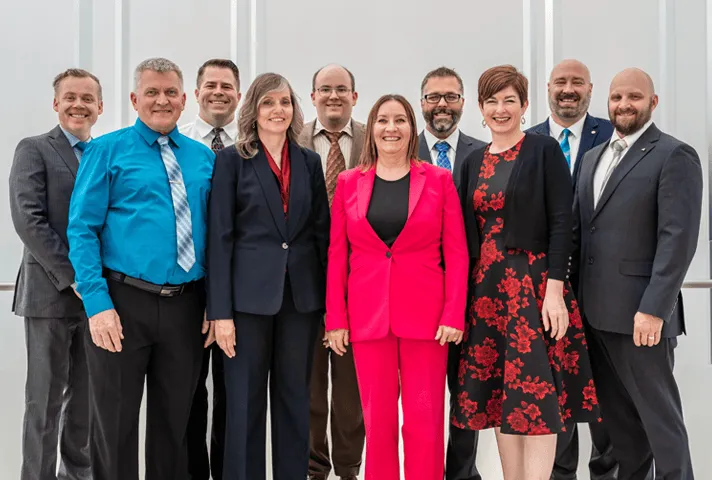
Eleven staff members with the Chambers Automation Program (CHAP) development and support team, of the District of Utah Bankruptcy Court, received the award for creating a streamlined, flexible interface for calendaring and managing cases. During the pandemic, the CHAP team assisted nine new courts in adopting the browser-based software while also delivering new features to increase security and to support public access to virtual hearings.
The court, which developed the CHAP program locally, was tasked by the Judicial Conference’s Information Technology Committee to make the software available to other bankruptcy courts. Today, 200 judges in 62 bankruptcy courts manage their work and court calendars using CHAP. Additionally, 38 courts use the ChapMobile App to provide on-demand court calendars to the public.
In addition to calendaring, judges and law clerks can create bench memos and notes and access case dockets and claims registers. Fully integrated with the CM/ECF system, the tool also makes it possible for attorneys to self-schedule hearings within specified blocks of time.
Award winners were: Brenda Dowler, CHAP support and training manager; Jonathon Hair, CHAP product and software development manager; and team members Heather Aslett, Nancy Carter, Kent Crockett, Andrew Groenewold, David Lemmon, Ian McMurray, Jeffrey Middleton, Scott Thackeray, and Jared Vanderhoff.
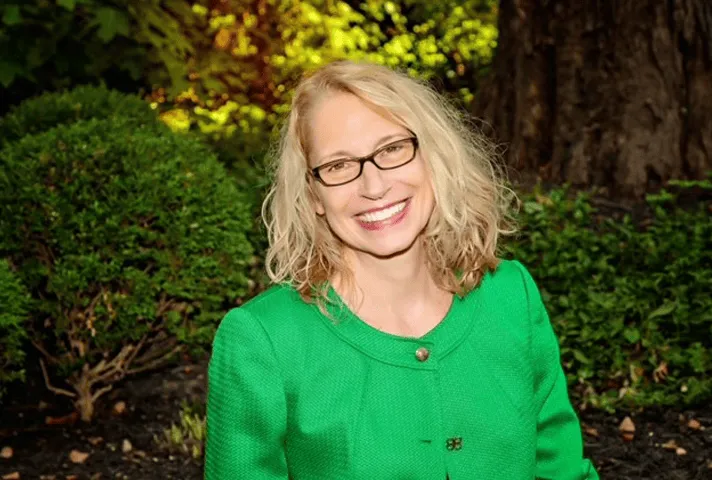
Vanessa Armstrong, director of financial integrity for the Sixth Circuit Court of Appeals, was recognized for providing assistance and training to courts and federal public defender offices throughout the Judiciary in the areas of audit preparation, financial and budget management, self-assessments, internal controls, process improvement, and travel policy.
More than 1,000 Judiciary employees have signed up for Armstrong’s weekly updates, and her training videos were viewed 2,000 times in the previous year. Online conversations regularly have hundreds of viewers, on such topics as accountable officer liability, self-assessments and cyclical audits, procurement, budget, and tenant alteration and cyclical maintenance delegations.

Victor M. Rodriguez, IT support specialist for the Middle District of Florida, received the award for creating a comprehensive mobile application providing judges and employees with essential security contact information and critical notifications in the event of weather emergencies, court closures, and other urgent situations.
By using the location data captured on cell phones, the app can display an interactive contact card with phone numbers for local U.S. Marshals, court security, and Federal Protective Service offices whenever employees are at or near the courthouse. Rodriguez designed the security application so it can easily be retooled to help other districts disseminate security information. The application is compatible with both iOS and Android devices, ensuring a wider reach and accessibility for a wide array of users.
Director’s Award for Extraordinary Actions – Multiple Winners

Kadi Murray, intensive supervision specialist for the Middle District of Florida’s Pretrial Services Office, was recognized for successfully preventing the suicide of a defendant who was under supervision and awaiting trial.
After midnight one day, Murray received an alert that a defendant under location monitoring supervision had traveled outside of his residence without prior approval. She called the defendant and members of his family and was able to provide the father with the defendant’s exact location using GPS mapping. The father arrived on the scene in time to prevent his son from taking his own life. Simultaneously, Murray called 911, and the defendant was taken to a hospital.
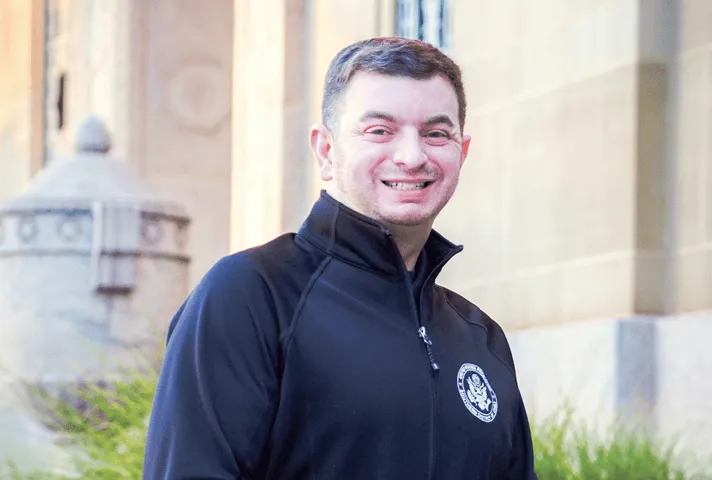
Brent Willoughby, probation officer for the Southern District of Ohio, was recognized for helping a man under supervised release overcome alcohol addiction and also for helping improve trust between supervisees and probation officers.
During a mentoring session for supervisees, the man credited Willoughby with helping him get sober and encouraged the others to “give your probation officer a chance by working to develop a trusting, honest relationship.”
The man explained how Willoughby answered his late-night plea for help, dropping everything to rush over to meet him at a bar. Willoughby listened to his troubles and developed a creative solution to get him home safely. The next day, he helped get him admitted to a treatment program.

Auralea L. Prince, automation specialist for the Northern District of Ohio Bankruptcy Court, was recognized for providing lifesaving CPR after a traffic accident outside her home while she was teleworking.
Prince was participating in a virtual staff meeting when she saw a minivan race across her front yard and crash into a field next to her house, narrowly missing two trees and a fence. She rushed outside, saw a man get out of the van and collapse on the highway, and called 911. She administered CPR until emergency responders arrived. The ambulance crew was able to restore the man’s pulse before taking him to a local hospital.
Annual Report 2023
- Annual Report 2023
- Funding and Budget
- The Courts and Congress
- The Federal Bench
- Accountability and Resource Management
- Facilities and Security
- Public Outreach and Communications
- Court Operations
- Defender Services
- Probation and Pretrial Services
- Human Resources
- Information Systems and Cybersecurity
- Recent and Proposed Amendments to Federal Rules
- In Profile
